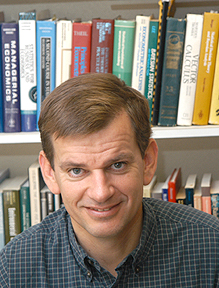|
Dr. Peter Reinelt, Economics Dept. “No one wants the climate to change, obviously,” Dr. Reinelt said. “There’s really only one reason the government and industry aren’t racing to stop carbon emissions, and that’s the perceived cost.” |
As nations across the planet come to grips with the realities of global warming, power plants that burn fossil fuel and send carbon dioxide into the atmosphere are regarded as probably the single most significant human contributors to the problem. At the same time, the world depends on the energy they produce.
|
|
Among the engineers, scientists, academics, politicians, and CEOs who are seeking solutions to the power plant challenge is Fredonia Professor Peter Reinelt, who teaches economics. He studies the economics of investing in new power plants when decision-makers are surrounded by regulatory uncertainty. So far, governments, especially at the federal level, have not committed themselves to legislation that would limit how much carbon dioxide plants are allowed to release.
On the other hand, Dr. Reinelt said, “Almost all power company executives expect that there will be regulation in the future. They know it’s just a matter of time, but they have to make investment decisions today.”
In the midst of this uncertainty, one technology being tried is called “carbon capture and storage,” a process that allows the burning of fossil fuel but grabs carbon before it is released and stores it away safely. Dr. Reinelt’s delivered a paper on the topic this summer in Trondheim, Norway at the 8th International Conference on Greenhouse Gas Control Technologies.
With nearly 1,000 experts attending from around the world, including most of the major U.S. electricity, oil, and power plant equipment-makers, not to mention government agencies, environmental groups, and academics, Dr. Reinelt saw evidence that the urgency of global warming is hitting home.
His paper, “Carbon Capture Retrofits and the Cost of Regulatory Uncertainty,” was placed in a session with leading researchers in the field. All seats for 200 people were filled, leaving standing-room-only observers in the back. The lineup of scholars came from M.I.T., Princeton, Carnegie Mellon, and SUNY Fredonia. He was questioned after his talk by one of the world’s top power plant designers and builders. “People are not questioning global warming anymore,” he said. “They are looking for solutions.”
Models of global warming and climate change show disastrous consequences once a certain stage is reached: a veritable domino effect of change that is stunning in its capacity to alter the world as it is known. Melting glaciers would cause sea levels to rise, which would cause coastlands to shrink, habitat to be lost, and the creation of millions of human refugees, most of them poor. It is also presumed that warming temperatures will destabilize ocean currents and induce profoundly cold weather in Great Britain and Europe, which, although northern in latitude, are now warmed by the ocean’s jet stream. Although there is a great deal of uncertainty as to the ultimate tableau of global warming, the greatest impact will be on the poorest people of the world who have the least resources to adapt to the changing climate.
“No one wants the climate to change, obviously,” Dr. Reinelt said. “There’s really only one reason the government and industry aren’t racing to stop carbon emissions, and that’s the perceived cost.”
That’s why Gov. Arnold Schwarzenegger’s signing last week of a sweeping global warming initiative in California was so newsworthy. He is the first governor to impose a cap on greenhouse gas emissions, taking the ultimate risk of facing down global warming when there’s money at stake.
Some wonder if California’s economy will be hurt by this action. But Dr. Reinelt, a former California resident who earned his Ph.D. at U.C. Berkeley in agriculture and resource economics, sees it differently. He takes the view that the cost of not knowing what to do and when to do it is greater in the long run.
“There is a cost to uncertainty,” he said. “There are no-regret strategies that industry can take right now that are worth doing. Legislation starts moving them along the path. It’s a very real possibility that California may benefit economically from taking this approach,” he said. “People resist spending money at first, but once you start to do something, and companies start looking for substitutes, they turn out to be not so costly as feared.”





